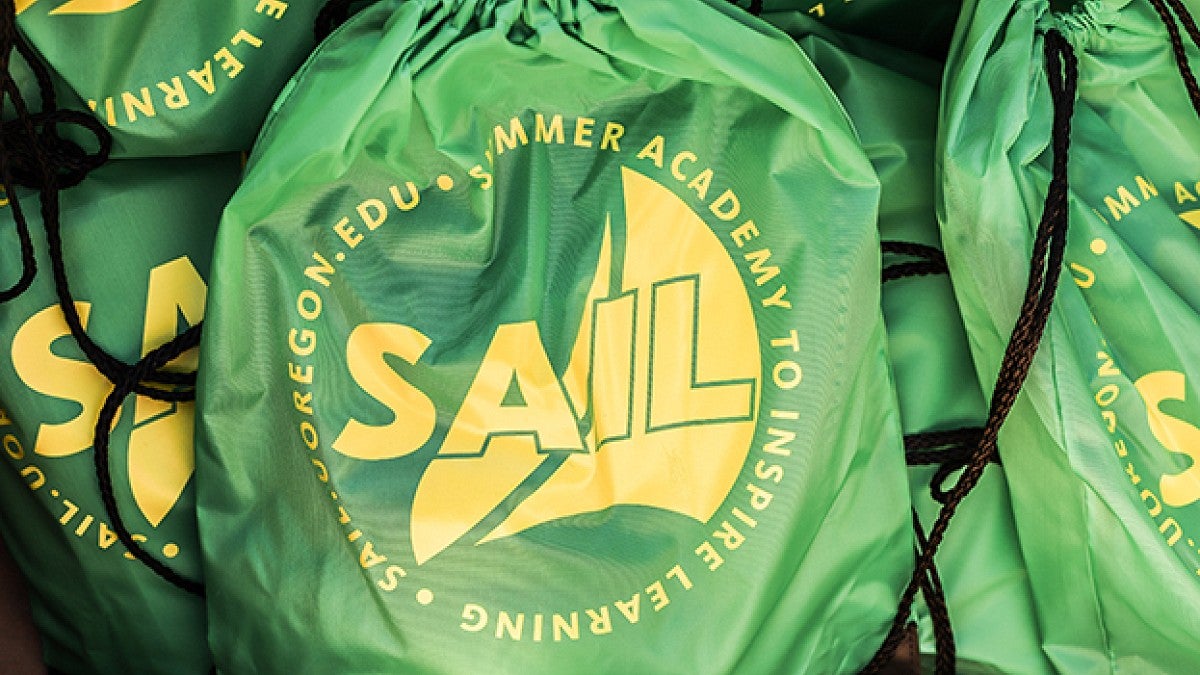A UO summer program that helps high school students prepare for college will soon be offered all year, thanks to the lessons learned when it was forced to go virtual due to the COVID-19 pandemic.
The Summer Academy to Inspire Learning, or SAIL, held its free classes virtually this summer. But rather than being a limitation, the virtual programming empowered the academy to build year-round offerings accessible to school districts locally and around the state and make an even bigger community impact.
“Since the pandemic, SAIL has recognized a greater need for students, teachers, administrators and families to stay engaged with learning and aspire to higher education,” said Executive Director Lara Fernandez. “As an important resource, we recognized we had to quickly overcome the challenge of doing programs virtually, instead of in-person like we have done for 15 years.”
Despite the new format this summer, Fernandez said almost all registered students not only stuck with the program but also did not want it to end. Participation even increased in terms of geographic measures and the diversity of students served.
The engagement was strong enough that SAIL was compelled to offer continuous, expanded programs into the fall, with no sign of stopping.
“We continue to keep up the momentum by designing much-needed programs using this new platform to reach more students and their families,” Fernandez said.
Since the start of the school year, students in local districts are availing themselves of a variety of SAIL’s offerings, including student mentors and panels, one-on-one essay assistance and workshops on hurdles like applying for financial aid.
UO faculty members have also contributed live guest lectures in their fields of expertise, ranging from psychology and marketing to languages, physics and journalism. The ongoing presentations are available on SAIL’s YouTube channel for later viewing.
SAIL’s outreach has been invaluable to Eugene 4J teacher Laura Queirolo ever since the program was founded, and this year is no different.
She teaches students from sixth to 12th grade in a program called Advancement Via Individual Determination, or AVID. The research-based program provides students from marginalized populations equitable access to the same rigorous academic opportunities as their peers and shares many of the goals of SAIL.
Queirolo, who also directs AVID, called SAIL’s new workshops “highly relevant” and said they “help students see the importance and, more importantly, the possibility of post-secondary education.”
They include topics like “FAFSA: What and How,” “Personal Budgets and Scholarships,” and “How To Set Yourself Up For Success.” Her students have received help with college and scholarship essays and had virtual visits from UO student panels sharing the realities of college life.
Seeing the other side of the college application process — and seeing themselves represented in the culture of higher education — is perhaps the most critical piece for Queirolo’s students.
“SAIL gives AVID students some context for what college is all about,” she said, showing them that “people just like them have overcome challenging circumstances and are now successfully attending college. They not only learn how to get there but they've also learned how to be successful once they arrive.”
SAIL has always been an effective and unique model for college student near-peer mentoring, said Program Manager Megan Faulkner.
“High school students are really willing to open up to our mentors with their questions, struggles and concerns,” he said. “And our SAIL college student mentors have really stepped up this year to create meaningful connections with high school students.”
For Adriana Alvarez, who teaches English language in Eugene’s Bethel School District, having a Spanish-speaking student panel join her class brought her students a real window into college life.
In thank-you letters Alvarez’s class wrote to SAIL, many expressed how kind the panelists were and how they were encouraged to achieve the careers they were studying for. They said they appreciated having their questions about college answered, but one letter writer realized that college students don’t have all the answers, and that’s OK.
“I didn’t know that when you’re in college, you can still ask for help,” the student said. “I thought that you had to do everything yourself.”
“You guys make it seem so easy,” another wrote.
The benefits of SAIL go both ways, said UO senior instructor of German Matthias Vogel, who contributed a presentation. The partnerships help first-generation college students, which he was himself, get a foot in the door and also help current UO students find amazing and instructive community service opportunities.
“I am thrilled to be supportive of all the SAIL students and encourage them to consider studying at the UO,” Vogel said. “The collaboration with SAIL is a wonderful opportunity to showcase teaching and learning in the language departments at the UO, and it is an outstanding way to offer internships to our advanced undergraduates and even graduate students.”
Another faculty presenter, Warsaw Sports Marketing Center Director Whitney Wagoner, said SAIL is a critical component of the outreach and recruitment efforts in the Lundquist College of Business.
“The program also allows the college to fortify an important element of our public mission,” she said, “which is to serve the larger state of Oregon community as an engine for education and growth.”
For more information about contributing a presentation, getting students involved or accessing SAIL’s programs, visit the current programs page on SAIL’s website, by emailing sailstaff@uoregon.edu or connecting on Instagram.
—By Anna Glavash, University Communications


